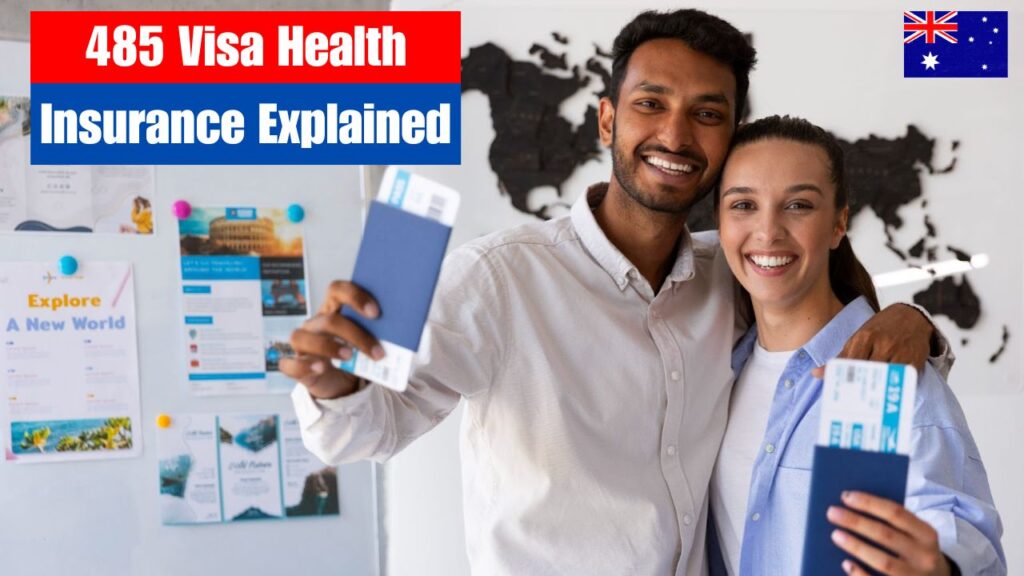Health Insurance – Applying for the Temporary Graduate Visa (Subclass 485) requires meeting several essential conditions, and one of the most important is having valid health insurance in Australia. Many international graduates overlook this requirement, but the Australian government clearly mandates that applicants must hold adequate health cover from the moment they lodge the visa until a decision is made. In this guide, you will find everything you need to know about 485 visa health insurance, including policy types, costs, benefits, and important rules every applicant should understand before beginning the visa process.

Health Insurance Requirement for Australian Graduates
The health insurance requirement for Australian graduates applying for the 485 visa ensures they maintain proper medical protection during their stay. Overseas Visitor Health Cover (OVHC) is the most common policy chosen by newly graduated students because it meets the minimum criteria set by the Australian immigration department. This type of cover protects you from high medical expenses, including hospital treatment, emergency care, and specialist services. It is important for applicants to compare multiple OVHC providers to find plans with suitable benefits, reasonable pricing, and broader inclusions such as ambulance cover. Australia requires all 485 visa applicants to hold valid insurance at the time of lodgement.
Mandatory Visa Health Cover for Australians Applying Offshore
Mandatory visa health cover for Australians applying offshore or international graduates who completed studies in Australia is a crucial part of the eligibility process. The Australian immigration authorities check whether the applicant has continuous health coverage from the date of application until the visa is granted. Without this, the application may be delayed or refused. Some graduates transitioning from OSHC (Overseas Student Health Cover) must switch to OVHC immediately after their student visa ends. Selecting a compliant health cover plan not only protects your health but also ensures you meet all visa processing conditions required across Australia.
| Health Cover Type | Purpose | Suitable For |
|---|---|---|
| OVHC Basic | Essential hospital cover | Low-budget applicants |
| OVHC Standard | Hospital + extras | General applicants |
| OVHC Premium | Comprehensive coverage | Families or long-stayers |
| OSHC to OVHC Switch | Compliance after studies | Student visa graduates |
| PR Pathway Health Cover | Long-term benefits | Applicants planning PR |
Visa Health Cover Options for People Across Australia
Visa health cover options for people across Australia vary depending on your needs, financial situation, and long-term goals. Some applicants prefer basic hospital-only insurance, while others choose higher-tier plans that include additional services such as dental, optical, and physiotherapy. When selecting a 485 visa health insurance plan, consider factors like waiting periods, emergency ambulance transport, and whether your provider offers nationwide support. Across Australia, major insurers offer flexible monthly or annual payment plans, making it easier for graduates to stay compliant with immigration rules while enjoying access to essential healthcare services needed throughout their stay.
Understanding OVHC Policies for the Australian Community
Understanding OVHC policies for the Australian community is essential, especially for graduates transitioning from student visas. OVHC policies are designed to ensure temporary residents do not rely on publicly funded healthcare systems such as Medicare. These policies typically cover in-hospital treatment, day surgeries, prescription medicines, and emergency care. It is important to read your insurer’s Product Disclosure Statement (PDS) carefully to avoid unexpected costs. International graduates who plan to stay longer or aim for permanent residency may consider premium OVHC packages offering extended benefits. These policies help reduce financial stress and ensure compliance with Australian government regulations.
Frequently Asked Questions (FAQs)
1. Do I need OVHC before lodging my 485 visa?
Yes, you must have valid OVHC at the time you apply for the 485 visa.
2. Can I use OSHC instead of OVHC?
No, OSHC is only for student visas, so graduates must switch to OVHC.
3. What happens if my health insurance expires?
Your visa application may be delayed or refused if your coverage is not continuous.
4. Which OVHC plan is best for 485 visa holders?
It depends on your budget and needs, but standard or premium plans offer broader benefits.




